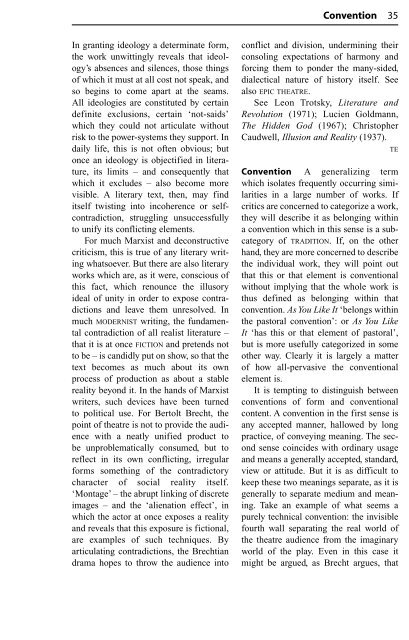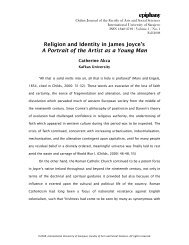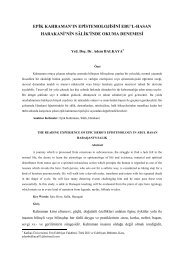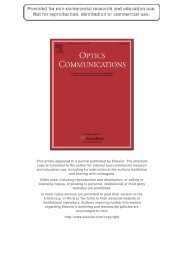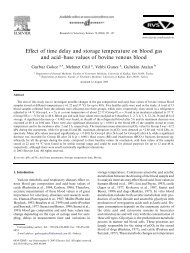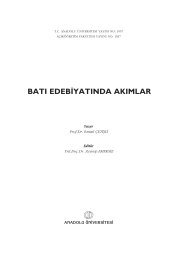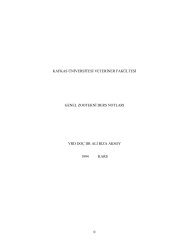The Routledge Dictionary of Literary Terms
The Routledge Dictionary of Literary Terms
The Routledge Dictionary of Literary Terms
Create successful ePaper yourself
Turn your PDF publications into a flip-book with our unique Google optimized e-Paper software.
In granting ideology a determinate form,<br />
the work unwittingly reveals that ideology’s<br />
absences and silences, those things<br />
<strong>of</strong> which it must at all cost not speak, and<br />
so begins to come apart at the seams.<br />
All ideologies are constituted by certain<br />
definite exclusions, certain ‘not-saids’<br />
which they could not articulate without<br />
risk to the power-systems they support. In<br />
daily life, this is not <strong>of</strong>ten obvious; but<br />
once an ideology is objectified in literature,<br />
its limits – and consequently that<br />
which it excludes – also become more<br />
visible. A literary text, then, may find<br />
itself twisting into incoherence or selfcontradiction,<br />
struggling unsuccessfully<br />
to unify its conflicting elements.<br />
For much Marxist and deconstructive<br />
criticism, this is true <strong>of</strong> any literary writing<br />
whatsoever. But there are also literary<br />
works which are, as it were, conscious <strong>of</strong><br />
this fact, which renounce the illusory<br />
ideal <strong>of</strong> unity in order to expose contradictions<br />
and leave them unresolved. In<br />
much MODERNIST writing, the fundamental<br />
contradiction <strong>of</strong> all realist literature –<br />
that it is at once FICTION and pretends not<br />
to be – is candidly put on show, so that the<br />
text becomes as much about its own<br />
process <strong>of</strong> production as about a stable<br />
reality beyond it. In the hands <strong>of</strong> Marxist<br />
writers, such devices have been turned<br />
to political use. For Bertolt Brecht, the<br />
point <strong>of</strong> theatre is not to provide the audience<br />
with a neatly unified product to<br />
be unproblematically consumed, but to<br />
reflect in its own conflicting, irregular<br />
forms something <strong>of</strong> the contradictory<br />
character <strong>of</strong> social reality itself.<br />
‘Montage’ – the abrupt linking <strong>of</strong> discrete<br />
images – and the ‘alienation effect’, in<br />
which the actor at once exposes a reality<br />
and reveals that this exposure is fictional,<br />
are examples <strong>of</strong> such techniques. By<br />
articulating contradictions, the Brechtian<br />
drama hopes to throw the audience into<br />
Convention 35<br />
conflict and division, undermining their<br />
consoling expectations <strong>of</strong> harmony and<br />
forcing them to ponder the many-sided,<br />
dialectical nature <strong>of</strong> history itself. See<br />
also EPIC THEATRE.<br />
See Leon Trotsky, Literature and<br />
Revolution (1971); Lucien Goldmann,<br />
<strong>The</strong> Hidden God (1967); Christopher<br />
Caudwell, Illusion and Reality (1937).<br />
TE<br />
Convention A generalizing term<br />
which isolates frequently occurring similarities<br />
in a large number <strong>of</strong> works. If<br />
critics are concerned to categorize a work,<br />
they will describe it as belonging within<br />
a convention which in this sense is a subcategory<br />
<strong>of</strong> TRADITION. If, on the other<br />
hand, they are more concerned to describe<br />
the individual work, they will point out<br />
that this or that element is conventional<br />
without implying that the whole work is<br />
thus defined as belonging within that<br />
convention. As You Like It ‘belongs within<br />
the pastoral convention’: or As You Like<br />
It ‘has this or that element <strong>of</strong> pastoral’,<br />
but is more usefully categorized in some<br />
other way. Clearly it is largely a matter<br />
<strong>of</strong> how all-pervasive the conventional<br />
element is.<br />
It is tempting to distinguish between<br />
conventions <strong>of</strong> form and conventional<br />
content. A convention in the first sense is<br />
any accepted manner, hallowed by long<br />
practice, <strong>of</strong> conveying meaning. <strong>The</strong> second<br />
sense coincides with ordinary usage<br />
and means a generally accepted, standard,<br />
view or attitude. But it is as difficult to<br />
keep these two meanings separate, as it is<br />
generally to separate medium and meaning.<br />
Take an example <strong>of</strong> what seems a<br />
purely technical convention: the invisible<br />
fourth wall separating the real world <strong>of</strong><br />
the theatre audience from the imaginary<br />
world <strong>of</strong> the play. Even in this case it<br />
might be argued, as Brecht argues, that


